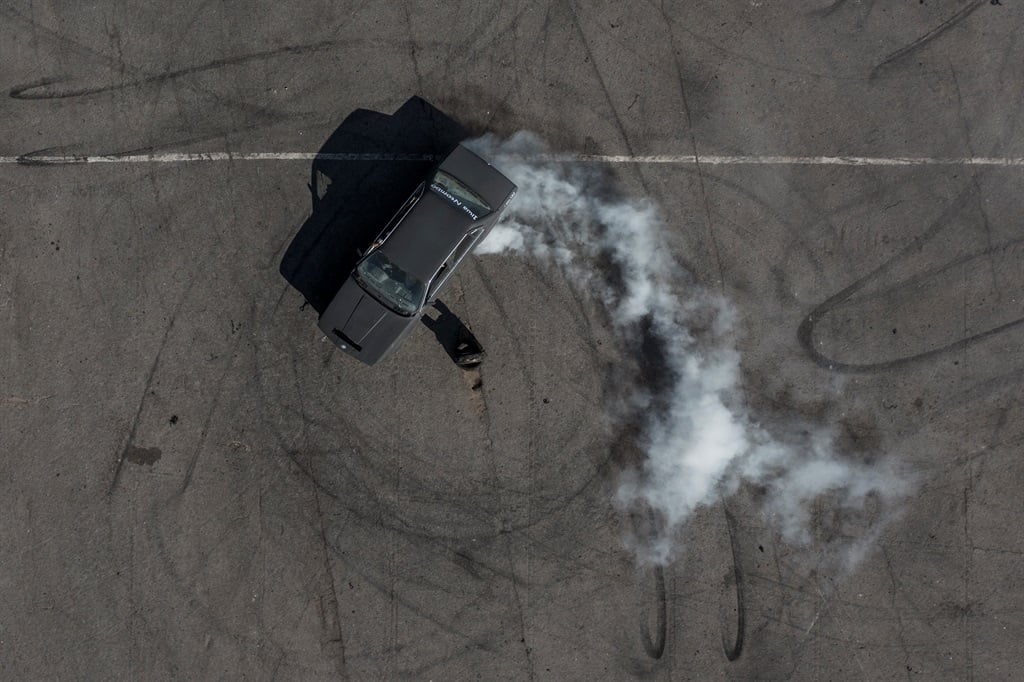Aerial view of South African spinner Nalo Jivhuho (40) also known as Dankie Darlie, as she spins one of her cars during a practice in Nasrec, Johannesburg, on August 07, 2024. (Photo by MARCO LONGARI / AFP)
Tyres screech across an empty parking lot in Soweto as 40-year-old Nalo Jivhuho sends her black BMW skidding and spinning in a cloud of white smoke and fumes.
As soon as she slips into the hotseat, the human resources developer becomes “Dankie Darlie”, impassioned enthusiast of South Africa’s increasingly popular daredevil motorsport of spinning.
In a tank top and braids, Jivhuho uses her tattooed left arm to spin the steering wheel as she forces the car into high-speed skids and stunts like the circular manoeuvre called a doughnut.
“If you are able to make a tyre pop, then you are pretty special,” says Jivhuho, mother of an admiring teenaged son. “When you hear a pop, you are going to hear the crowd go wild.”
This adrenaline-pumping sport was born in Johannesburg’s sprawling Soweto township in the 1980s, when South Africa was still under the race-based apartheid system.
“It used to be seen as a gangster sport associated with people going into the white areas to steal these shaped cars, come to Soweto and spin them,” says Jivhuho.
The underground image changed when spinning was recognised as an official sport 10 years ago; today it has fans and performers across southern Africa and big brand sponsors.
At its most extreme levels, the passenger or even driver will climb out of the spinning car, hanging from the window or roof in stunts that thrill the crowds.
A few hours before Jivhuho’s training session, her four cars are checked over at her home by an all-male group of mechanics. “She can kill you for these cars,” jokes one of them, Nqobile Tshabalala.
Jivhuho says: “Maintaining these spin cars is a lot but I have a great support system from my family and my team. Without them, ‘Dankie Darlie’ would not exist.”
She wants to make one thing clear: she is not “one of the boys”. “Spinning is a way of me expressing myself, expressing my femininity,” she says.
READ | Driven to be legendary: How two of SA’s top female racers fuel dreams and inspire generations
“I inspire other females and that’s a big thing because there aren’t a lot of us females in the spinning industry in South Africa.”
Young women are also among the drivers at a weekend show at the Wheelz N Smoke arena southeast of Johannesburg.
The atmosphere is festive as hundreds of spectators, some with coolers and shisha pipes, cheer on spinning crews who have come from across the country to show off their skills.
The noise and smell of burning rubber and exhaust fumes is intoxicating. Of the more than two dozen cars taking part, some have no hoods or windscreens; one is souped up to look like a New York taxi.
In some performances, a passenger leans right out of the car to hype the crowds as the driver pulls stunts and manoeuvres around obstacles. There are a couple of cars with just a solo woman at the wheel; in one, a mom and dad are in the front seats with their two children in the back.
Off track, men carry away shredded tyres.
“Man, I’m a petrol head, so anything that makes some noise and a lot of smoke will get me going!” says Chahid, who only gives his first name, as he watched from his burger stand.
He enjoys this arena, the oldest in South Africa. “It’s secured, the kids are safe, families can come, it becomes a family affair,” he says.
As the sport became recognised, the arena moved spinning off the streets and into a space that better protects spectators. “It is more of a danger to them if a car happens to lose control,” says the owner, Monde Hashe.
“I started spinning when it was illegal,” says professional spinner Iksaan “Iki” Khan. “When this place opened, we had more opportunities and more play time,” he says, as he heads out to perform.




